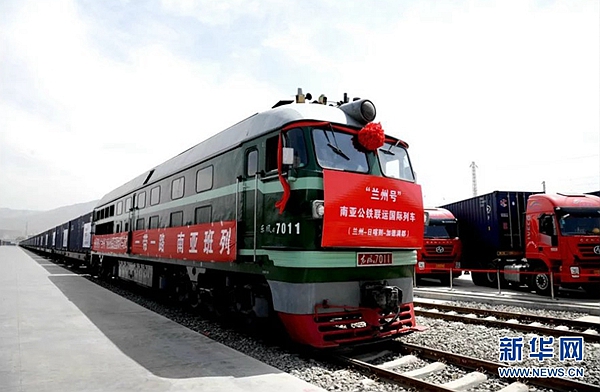BRI can be a vehicle for trilateral cooperation
- By Ritu Raj Subedi
 0 Comment(s)
0 Comment(s) Print
Print E-mail China.org.cn, April 23, 2018
E-mail China.org.cn, April 23, 2018
It appears that the time is ripe for pushing the idea of trilateral cooperation between Nepal, China and India. Nepal aspires to be a "dynamic bridge" between India and China, and now has a stable and strong government after decades of political transition. It is in a better position to execute independent foreign policies that hold the key to implementing major bilateral or trilateral initiatives.

While Nepal and China have been enjoying trouble-free ties since the establishment of diplomatic relations in 1955, India's strained relations with Nepal and China are gradually thawing.
Nepal-India relations soured in 2015 after India imposed an economic embargo on Nepal over the promulgation of its new constitution. India has since realized the blunder and moved to mend fences with Nepal. The recent visit of Nepal's Prime Minister KP Sharma Oli to India significantly helped overcome distrust and create a fresh start between the two neighbors.
The Donglang (Doklam) stand-off in 2017 brought Sino-Indian ties to a low point. Now India and China are inching closer to restarting efforts for mutual benefit. The two nations have witnessed a flurry of exchanges between high-level officials from both sides. India seems unwilling to waste the economic and trade opportunities that come with engagement with China.
With this positive ambiance developing, China's landmark Belt and Road Initiative (BRI) may serve as the catalytic instrument to realize the much-vaunted concept of trilateral cooperation. Nepal is already a signatory to the BRI that has been endorsed by the United Nations, but India is still hesitating to join the Chinese global project for fear of losing its clout in South Asia and beyond.
China has mulled over the prospect of creating an economic corridor involving Nepal, China and India under the broader framework of BRI.
"When the connectivity network under the BRI is well developed, there can be a prospect for an economic corridor connecting China, Nepal and India," said Chinese State Councilor and Foreign Minister Wang Yi.
Speaking at a joint press conference with his Nepali counterpart Pradeep Gyawali in Beijing on April 18, Wang underlined that China and India should have a "common understanding to support Nepal in its quest for prosperity." He was of the view that China, Nepal and India were natural allies and partners connected by shared rivers and mountains.
He said that China and Nepal agreed on a long-term vision of a multidimensional cross-Himalaya connectivity network, with links to ports, railways, highways, aviation, electricity and communications. Cross-Himalaya connectivity is vital to spur trade, investment and cooperation in the region.
The statement of Chinese Foreign Minister provides impetus to the desires of the Nepali people that China and India should forge work together for the economic development of Nepal as well as the region at large. India is expected to respond to the notion of an economic corridor involving the three countries positively.
"We want to build a bridge between China and India for economic development and prosperity of the country," said Nepal's Foreign Minister Gyawali, adding that Nepal appreciates China's neighborhood diplomacy, which is guided by sincerity, amity, mutual benefit and inclusiveness.
The concept of trilateral cooperation came to the fore in 2008 when former Nepal's PM Pushpa Kamal Dahal Prachanda first mentioned it to former Chinese President Hu Jintao during his first visit to the northern neighbor.
The agenda of trilateral strategic partnership among the three nations become a hot subject when Prachanda again floated it during his meeting with Indian Prime Minister Narendra Modi and Chinese President Xi Jinping during the BRICS Summit in Goa, India, in 2016.
Chinese President Xi commended the idea and emphasized strengthening relations between three nations. Indian PM Narendra Modi also welcomed it, noting that the three nations shared geographical, emotional and cultural relations.
However, the three countries have not yet formally taken up this agenda in their bilateral meetings. Now the time has come for them to fulfill the grand idea by riding on the back of BRI for the common development and prosperity of the region.
Ritu Raj Subedi is an associate editor of The Rising Nepal.
Opinion articles reflect the views of their authors, not necessarily those of China.org.cn.






Go to Forum >>0 Comment(s)